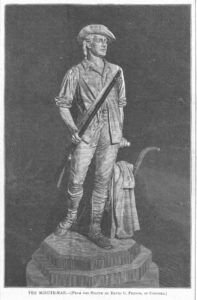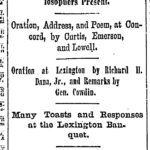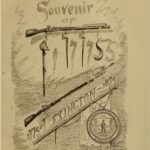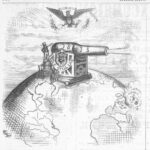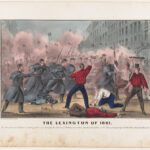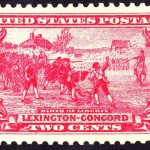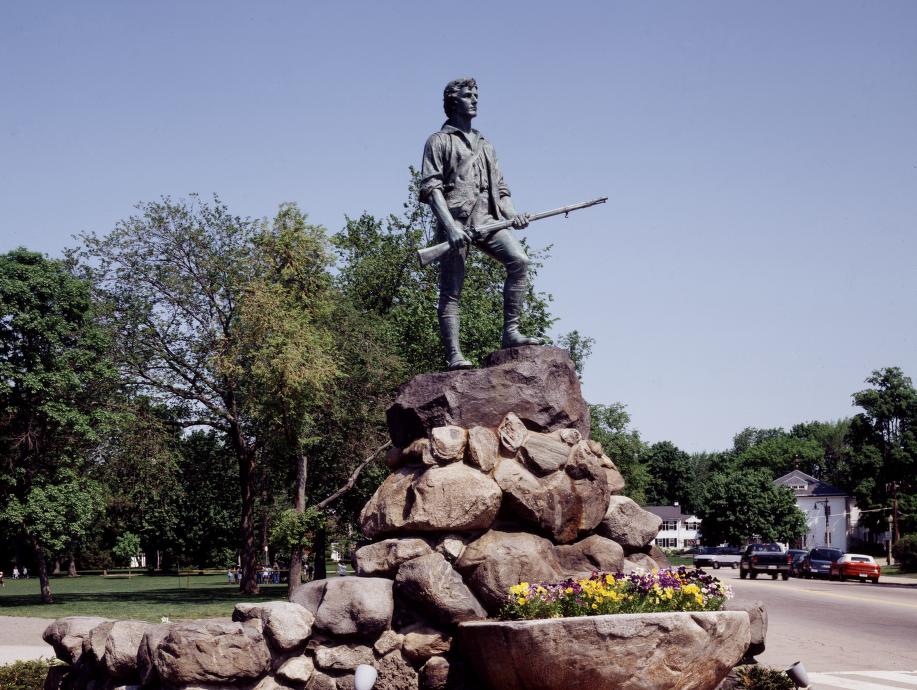150 years ago Americans were beginning to celebrate the United States Centennial. On April 19, 1875 large crowds were in Lexington and Concord, Massachusetts to commemorate the battles that took place a century earlier. In an editorial in its May 8, 1875 issue (page 375) Harper’s Weekly praised the good behavior of the crowds in Lexington and Concord, especially given the dearth of police officers at the sites:
THE NINETEENTH OF APRIL.
THE imposing spectacle of the first great Centennial anniversary of the Revolution, the day of Concord and Lexington, is the beginning of a long and proud series of holidays which will continue for seven years. They open in Massachusetts, and they will close in Virginia. Every event of the long struggle was but a logical consequence of the 19th of April, and Yorktown was the natural result of Concord, Lexington, and Bunker Hill. The next great day is that of Bunker Hill, within less than two months — the day of PRESCOTT, PUTNAM, and of “him, ah! him” — JOSEPH WARREN. It falls in the loveliest season of the year, and it commemorates the most familiar and famous of the Revolutionary battles, and will be observed with an enthusiasm which all that of the late great day will not abate. General DEVENS, now upon the Massachusetts bench, an accomplished and magnetic orator, will deliver the address, standing where DANIEL WEBSTER stood fifty years ago. LAFAYETTE was then here, and sat by the orator. Revolutionary veterans were grouped around him, and as the orator apostrophized them, the air rang with grateful acclamations. The speaker of to-day will be inspired with the glorious remembrance, and the emotion of the hour will have a fitting utterance.
Nor can there be any doubt of the happy moral and patriotic effect of these Centennial holidays. They will teach the whole country its heroic early history, and make it familiar with the soldiers and statesmen of the Revolution; and they will show that quality of character and the nature of those institutions which have made republican government possible. The celebration of the 19th of April was a pleasant illustration of the habit and power of popular self-control in New England. The throng of people in the two villages of Concord and Lexington was immense and unprecedented, and there could be very little management except that which the people themselves chose to provide. The police were few, and could make only a show of authority against such overwhelming odds. But the vast crowd in both villages, although there were necessarily confusion and disorder, was not riotous nor headstrong, and while there were more than a hundred thousand holiday strangers in the two towns, there was no serious accident or mishap. Every man was used to taking care of himself. He was a son of independence. During a sudden tumult in the tent at Concord the president of the day, Judge HOAR, said that the sovereign people of America are gentlemen, and when they assemble upon such an occasion, they will keep order and preserve silence. And they justified his words. The quality to which he appealed, and of whose existence he was conscious, is just that which has made the country. It is, in the best sense, conservative, as Mr. DANA showed in his masterly discourse at Lexington when he was speaking of the colonists. When this power of self-control is lost, popular government becomes impracticable, and until it exists such a government is impossible. The dependence upon the army, which is so familiar a fact in France, is the powerful argument against a French republic.
There is another aspect of the Centennial anniversaries which is interesting and valuable. They will present to the popular mind, in speech and essay, the actual superiority in general condition of the American citizen. When all exception is made and criticism is exhausted, there remains the fact that every man has a fairer chance in America than elsewhere. In many special points we are surpassed in other lands, but upon the whole the well-being is greater here. The poor man does not instinctively turn to Europe, but to America. Again, and just at this time, the Centennial holidays, by kindling the most generous patriotism, tend to reunite the country. It was a very striking spectacle at Lexington, that of the Governor of South Carolina responding cordially, and with sincere, not formal, cordiality, to the hearty greeting of Massachusetts. He was not, indeed, a South Carolinian by birth, but he was a fair representative of the new South Carolina, which will be again as closely bound with Massachusetts as the two colonies were a hundred years ago. And on the 17th of June the Georgian who may answer as warm a welcome will not propose to call the roll of his slaves on Bunker Hill, but to call his State upon the roll of freedom.
A revival of a just and noble national pride will be a renewal of the national character, and that is what we have the right to expect of the Centennial days. It will inspire every American with an interest in the great Centennial Fourth of July which nothing else could produce; and when at the Concord dinner General HAWLEY, the president of the Centennial Commission, appealed to the audience in behalf of the due celebration of the victories of peace which are not less renowned than those of war, there was a hearty and universal response. The greatest and happiest result of the Centennial years will be the promotion of a new era of national good feeling, founded not upon disastrous compromise, but upon sound, original, and eternal American principles, which are now sure to be freshly considered and approved by the American people.

